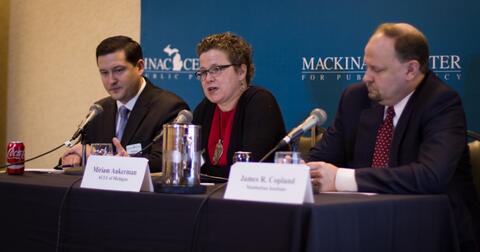How to Deal with Michigan’s Vast Criminal Code
Panel discussion notes the problem, solutions of too many crimes
LANSING – Michigan's criminal code, say experts, is vast, outdated and growing, and putting citizens at risk of committing at least a crime a day.
That was the message of the participants in a panel discussion on “overcriminalization.” The event featured Michael Reitz, executive vice president of the Mackinac Center for Public Policy; Miriam Aukerman, a staff attorney for the ACLU of Michigan; and James Copland, the director of the Manhattan Institute's Center for Legal Policy.
Reitz and Copland are co-authors of a recent study on crime in Michigan. The report, “Overcriminalizing the Wolverine State” notes:
- Michigan’s penal code contains 918 sections – eight times the number of the Model Penal Code and significantly more than that of neighboring states Ohio, Illinois, and Wisconsin.
- Michigan has at least 3,102 crimes – 1,209 felonies and 1,893 misdemeanors – and most of these (48 percent of felonies and more than 76 percent of misdemeanors) lie outside the penal code.
- Michigan has created, on average, 45 crimes annually over the last six years; 44 percent of were felonies, and 73 percent fell outside the penal code.
At the event, Reitz said one main problem is that the Legislature spends most of its time adding new laws and very rarely repealing old ones. This leaves Michigan's criminal code overcrowded and outdated.
Reitz said Michigan's criminal statutes suffer from three defects: First, the code is so overpopulated that the average person cannot keep track of the number of laws on the books. Second, some laws are regulated to such a degree that the punishment no longer fits the crimes. As an example, similar misdemeanors may carry different punishments. And third, criminalizing conduct that most people at a gut level would agree is not something that is wrong – like laws against dancing to the “Star Spangled Banner” or transporting a Christmas tree without a receipt.
“A state’s criminal code should protect individual liberty and private property – not be a tool to regulate every part of human conduct,” Reitz said.
Aukerman discussed some cases in which the ACLU is representing people who have been treated as criminals for acts that arguably shouldn’t be a crime. She showed a video of two musicians who were arrested in Saugatuck for violating an ordinance prohibiting the playing of music in public spaces. Viola player Christopher Waechter and guitarist Gabe Novak are college students who were trying to earn a few bucks as street musicians – both spent time in jail for their “crimes.” The ACLU is representing them.
The ACLU is also representing individuals who are being prosecuted by the City of Grand Rapids for violating trespassing laws. In one case, Aukerman said, a man was arrested after chatting in a private parking lot for just three minutes.
She also agreed that a big problem is labeling as felonies some things that should be misdemeanors or civil infractions. For example, being put in jail and establishing a criminal record for keeping the wrong kind of fish, riding a snowmobile on private property without written permission, or keeping rabbits.
Aukerman noted that people serve significantly more time in prison in Michigan than in other states for the same crimes. Just making Michigan the average of other states would save $530 million annually in correction costs.
“Here in Michigan, we have a lot of crimes in which the punishments are excessive,” she said. “We pay the cost of that as taxpayers.”
Copland said the biggest issue may be the growth of the regulatory state. More and more crimes are established by administrative agencies rather than elected officials.
“We should worry about innocent people getting ensnared in this criminal justice system ... for something in which it is very difficult to know if they committed a crime,” Copland said.
In order to help fix these problems, Copland suggested two main solutions. First, the state should establish a “default 'mens rea,'” which means a crime would only occur if a person knowingly commits a crime or the Legislature puts it in the statute (this was adopted in Ohio). Second, a commission should be established to go through current statutes and clean them up – eliminating those that are outdated.
Reitz concluded by saying that the problem with having so many laws is that “everyone is a criminal” and government prosecution is more discretionary. Also, he added, civil society and the rule of law are eroded because individuals are selectively choosing what to obey and what not to obey.
~~~~~
A replay of the event:
Michigan Capitol Confidential is the news source produced by the Mackinac Center for Public Policy. Michigan Capitol Confidential reports with a free-market news perspective.


 Payouts from Michigan’s teacher loan program plummet 97% after rule change
Payouts from Michigan’s teacher loan program plummet 97% after rule change
 Michigan Supreme Court to hear retaliation case tied to Wayne County forfeiture program
Michigan Supreme Court to hear retaliation case tied to Wayne County forfeiture program
 Michigan clawing back $2.7B from 350,000 people
Michigan clawing back $2.7B from 350,000 people